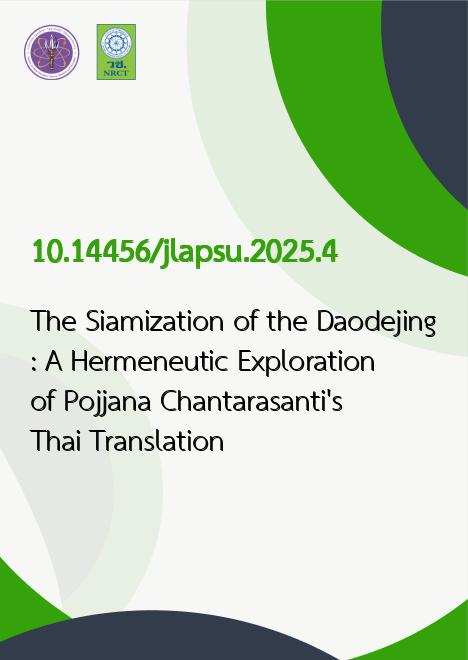
|
The Siamization of the Daodejing: A Hermeneutic Exploration of Pojjana Chantarasanti’s Thai Translation |
|---|---|
| รหัสดีโอไอ | |
| Creator | Charintorn Burapa |
| Title | The Siamization of the Daodejing: A Hermeneutic Exploration of Pojjana Chantarasanti’s Thai Translation |
| Publisher | Faculty of Liberal Arts, Prince of Songkla University |
| Publication Year | 2568 |
| Journal Title | Journal of Liberal Arts, Prince of Songkla University |
| Journal Vol. | 17 |
| Journal No. | 1 |
| Page no. | 284263, pp.1-20 |
| Keyword | Daodejing, Hermeneutics, Laozi, Philosophy of Interpretation |
| URL Website | https://so03.tci-thaijo.org/index.php/journal-la/index |
| Website title | Journal of Liberal Arts, Prince of Songkla University |
| ISSN | 2651-1126 |
| Abstract | This paper explores Pojjana Chantarasanti’s Thai translation of the Daodejing, which reflects a culturally mediated interpretation shaped by Thailand’s intellectual and cultural framework rather than a direct linguistic transfer. This raises fundamental questions about how the meaning of the Daodejing shifts when viewed through a Thai lens. By engaging with Hans-Georg Gadamer’s hermeneutic theory, particularly his concepts of “text-tradition” and “effective history”, this paper argues that translation is not simply a transfer of meaning, but a dynamic process involving a “fusion of horizons”, in which the text and interpreter mutually shape one another. The study finds that Chantarasanti’s translation of the term “wúzhī” (無知), meaning “without knowing”, as the Pali term “avijjā”—a Buddhist concept often translated as “ignorance”, as seen in the Thai phrase “lathing awitcha”, meaning “to abandon ignorance”. This reflects his awareness of the differing traditional roots of the Daoist concept “wúzhī” and the Pali-Buddhist concept “avijjā.” This demonstrates how Daoist philosophy is reinterpreted within the Thai intellectual context. I refer to this process as "the Siamization of the Daodejing", which exemplifies how Daoist thought is adapted to Thailand’s intellectual and cultural traditions. This paper presents a transcultural approach to Daoism, showing how Chinese philosophy can be creatively reinterpreted across traditions and contribute to broader, cross-cultural philosophical discourse. |